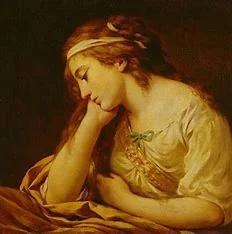John Keats was a great poet of Romantic period he has inked a number of odes but ‘Ode on Melancholy’ is the most remarkable one. The poet starts this poem with a precious and priceless advice to the seekers of true melancholy. He advises them what they should not do to achieve real and solid melancholy. The poet says that;
‘No, no, go not to Lethe.’
When one drinks the water of rival Lethe (the
river of forgetfulness) one’s senses are benumbed. One’s soul becomes senseless
and lifeless.it becomes impossible to enjoy the full force of melancholy in
such conditions. According to Keats, it is a creative process which enables
someone to creates something extra ordinary. So, the poet advises the
melancholy seekers to make fullest use of melancholy so that they may create
something extra ordinary. In the very first stanza, Keats says;
“No, no, go not to Lethe, neither twist,
Wolf's-bane, tight-rooted, for its poisonous wine,
Nor suffer thy pale forehead to be kiss'd,
By nightshade, ruby grape of Proserpine.”
The poet says that if you want to enjoy the
full force of melancholy, you should not make a rosary with the berries of yew
tree. The churchyard of yew trees is associated with death and mourning. Then
the poet asserts;
“Nor let the beetle, nor the death-moth be,
Your mournful Psyche, nor the downy owl,
A partner in your sorrow's mysteries.”
It means that to indulge in mourning thoughts
cannot enable us realize what melancholy actually means.
The melancholy seekers should not make ‘Soft
feathered owl’ an inspirer of their thoughts. It is ominous bird of darkness.
In short, if they associate themselves with death, pain and deeper tragedies of
their life, their soul will be dead and the force and vigour of melancholy will
vanishes. Then the poet describes the moment;
“But when the melancholy fit shall fall,
Sudden from heaven like a weeping cloud,
That fosters the droop-headed flowers all,
And hides the green hill in an April shroud.”
Now, the poet gives four suggestion about what
we should do when we are captured by a sudden fit of melancholy.
Firstly, we should rest our eyes on the
blooming roses. We should make penetrating observation of the dew drops. The
beauty of roses and dew drops will make us realize that beauty is short lived
and transitory.
Secondly, we should see the beautiful colours
of rainbow. The multi-coloured rainbow will console us. Thirdly, we should
dwell upon the rich beauty of round shaped flowers. The last advice that the
poet gives;
“Or if thy mistress some rich anger shows,
Emprison her soft hand, and let her rave,
And feed deep, deep upon her peerless eyes.”
In the last stanza, the poet delineates the
actual character of melancholy. He informs us about the relationship between
melancholy and other sentiments. The poet wields concrete images and
personifications. Keats goes to personify melancholy as a goddess.
“She dwells with Beauty—Beauty that must die.”
The goddess of melancholy and the god of joy
are the dwellers of same temple. The god of joy is ever willing and ever ready
to bid farewell to his worshippers. The poet wants to say that melancholy and
joy are inseparable.
“Ay, in the very temple of Delight
Veil'd Melancholy has her sovran shrine.”
Only he who appreciates delight can praise
melancholy. The poet conveys this idea through the image of a grape. Joy is a
grape and one who presses it hard against the soft roof of mouth, can taste it.
“His soul shalt taste the sadness of her might,
And be among her cloudy trophies hung.”
The discussion enables us to reach a conclusion that Keats was a great poet of his time.
Poem: 'ODE ON MELANCHOLY'
(John Keats)
No, no, go not to Lethe, neither
twist
Wolf's-bane, tight-rooted, for its
poisonous wine;
Nor suffer thy pale forehead to be
kiss'd
By nightshade, ruby grape of
Proserpine;
Make not your rosary of yew-berries,
Nor let the beetle, nor the
death-moth be
Your mournful Psyche, nor the downy
owl
A partner in your sorrow's mysteries;
For shade to shade will come too
drowsily,
And drown the wakeful anguish of the
soul.
But when the melancholy fit shall
fall
Sudden from heaven like a weeping
cloud,
That fosters the droop-headed flowers
all,
And hides the green hill in an April
shroud;
Then glut thy sorrow on a morning
rose,
Or on the rainbow of the salt
sand-wave,
Or on the wealth of globed peonies;
Or if thy mistress some rich anger
shows,
Emprison her soft hand, and let her
rave,
And feed deep, deep upon her peerless
eyes.
She dwells with Beauty—Beauty that
must die;
And Joy, whose hand is ever at his
lips
Bidding adieu; and aching Pleasure
nigh,
Turning to poison while the bee-mouth
sips:
Ay, in the very temple of Delight
Veil'd Melancholy has her sovran
shrine,
Though seen of none save him whose
strenuous tongue
Can burst Joy's grape against his
palate fine;
His soul shalt taste the sadness of
her might,
And be among her cloudy trophies
hung.
Explore Romantic Poetry
Continue your journey with our curated collections:

No comments